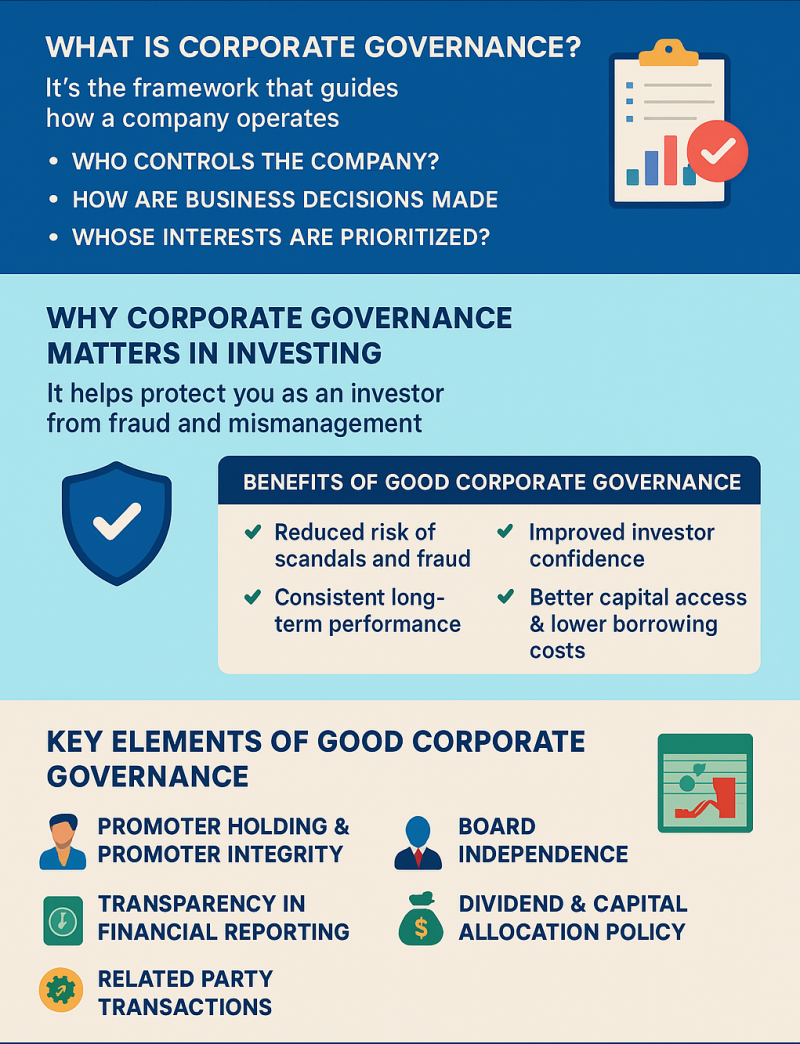
The Role of Corporate Governance in Investing
The Role of Corporate Governance in Investing
Why It Matters More Than Ever for Retail Investors
When evaluating a company for investment, many retail investors focus primarily on financial performance—profits, sales growth, valuations, and return ratios. While these numbers are undeniably important, they don’t always reveal the full story. A company with strong earnings today may face serious challenges tomorrow if its leadership, decision-making, and ethical framework are weak.
Thank you for reading this post, don't forget to subscribe!This is where Corporate Governance becomes crucial.
Corporate governance refers to the system of rules, practices, and processes through which a company is directed and controlled. It determines how decisions are made, who has power, how conflicts are handled, and how accountable management is to shareholders. For investors, strong corporate governance acts as a safety shield—protecting them from fraud, mismanagement, and erosion of shareholder value.
What Is Corporate Governance?
Corporate governance is essentially the framework that guides how a company operates. At its core, it answers three key questions:
-
Who controls the company? (Promoters, board of directors, institutional investors)
-
How are business decisions made? (Transparency and accountability)
-
Whose interests are prioritized? (Shareholders, customers, employees)
A well-governed company ensures that:
-
Managers act in the best interest of shareholders.
-
Financial reporting is accurate and transparent.
-
Policies and strategic decisions are made ethically.
-
Stakeholder rights are protected.
Why Corporate Governance Matters in Investing
Even a fundamentally strong business can fail if governance is poor. India has seen multiple high-profile examples:
| Company | Corporate Governance Issue | Outcome |
|---|---|---|
| Satyam Computers (2009) | Accounting fraud by management | Massive wealth destruction |
| IL&FS (2018) | Board oversight failure | Debt default crisis |
| DHFL (2019) | Corporate wrongdoing & fund misuse | Collapse & bankruptcy |
These incidents remind investors that bad governance can erase shareholder value overnight.
Benefits of Strong Corporate Governance:
-
Reduced risk of scandals and fraud
-
Consistent long-term performance
-
Improved investor confidence
-
Better capital access & lower borrowing costs
In short, governance influences both risk and returns.
Key Elements of Good Corporate Governance
1. Promoter Holding & Promoter Integrity
Promoters should have:
-
A reasonable but not excessive holding (too high = dominance risk; too low = weak control).
-
A clean track record with no major regulatory violations or fraud cases.
2. Board Independence
A company’s board should include Independent Directors who are:
-
Qualified and experienced
-
Free from conflicts of interest
-
Willing to question management decisions
Independent oversight reduces misuse of authority.
3. Transparency in Financial Reporting
Investors should evaluate:
-
Quality of annual report disclosures
-
Auditor reputation (avoid frequent changes)
-
Clear revenue recognition and expense accounting practices
Opaque financial reporting is often a red flag.
4. Dividend & Capital Allocation Policy
A good company:
-
Uses capital wisely
-
Avoids unnecessary diversification or acquisitions
-
Balances dividends and reinvestment
Companies that hoard cash without clear growth plans might not be shareholder-friendly.
5. Related Party Transactions
Excessive business transactions between the company and promoter-owned entities may indicate:
-
Fund siphoning
-
Overpricing or mispricing
-
Conflict of interest
Investors should check disclosures closely.

How Retail Investors Can Evaluate Corporate Governance
You do not need to be a forensic auditor to identify governance quality. Look for these signs:
| Positive Indicators | Red Flags |
|---|---|
| Stable promoter shareholding | Sudden promoter stake sale |
| Clean audit report (no disclaimers) | Frequent auditor changes |
| Transparent investor communication | Complex or vague financial statements |
| Independent & diverse board | Family-dominated board |
| Consistent dividend & capital allocation | Unexplained debt increase |
Most of this information can be found in:
-
Annual Reports
-
Corporate Announcements
-
Conference Calls
-
SEBI disclosures
-
Business media updates
Case Study Example (Simplified)
HDFC Bank:
-
Professional management
-
Strong oversight systems
-
Consistent audit transparency
→ Result: Stable growth, strong shareholder returns, high market trust.
Yes Bank (Before Crisis):
-
Concentrated decision-making
-
Aggressive and opaque lending practices
-
Governance concerns ignored
→ Result: Value destruction and regulatory intervention.
Governance ultimately shapes long-term outcomes.
Final Thoughts
Corporate governance is not just a “nice-to-have” factor—it is a critical investment criterion. While short-term market sentiment may favor rapidly growing or highly valued companies, poor governance can derail even the strongest business models.
A disciplined investor evaluates both:
-
What the company earns (financial performance)
-
How the company earns it (governance & ethics)
If the foundation is weak, the structure will not last.
Next Step Recommendation
Before investing, always:
✔ Read the company’s annual report (especially governance, auditor notes, and management commentary)
✔ Track promoter actions, not words
✔ Compare governance quality across peers
Related Blogs:
How to Use Annual Reports to Evaluate a Company
How to Analyze Management Quality Using Publicly Available Data
How to Read a Company’s Balance Sheet Before Investing
What Is Fundamental Analysis? A Beginner’s Guide
Understanding the Income Statement: A Beginner’s Guide
Understanding Cash Flow Statements for Investors
Disclaimer: This blog post is intended for informational purposes only and should not be considered financial advice. The financial data presented is subject to change over time, and the securities mentioned are examples only and do not constitute investment recommendations. Always conduct thorough research and consult with a qualified financial advisor before making any investment decisions.

